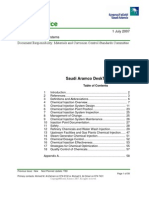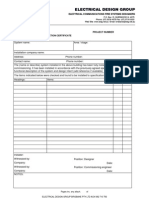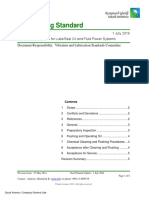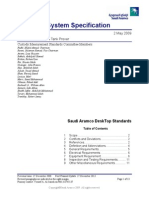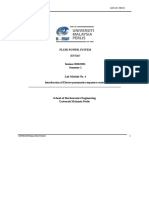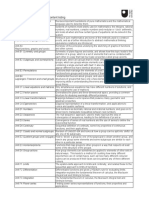Aramco
Aramco
Uploaded by
jogiyajeeCopyright:
Available Formats
Aramco
Aramco
Uploaded by
jogiyajeeOriginal Description:
Original Title
Copyright
Available Formats
Share this document
Did you find this document useful?
Is this content inappropriate?
Copyright:
Available Formats
Aramco
Aramco
Uploaded by
jogiyajeeCopyright:
Available Formats
Engineering Standard
SAES-A-205 Oilfield Chemicals Materials and Corrosion Control Committee Members
Al-Anezi, Mohammed A., Chairman Al-Rumaih, Abdullah M., Vice Chairman Abdulhadi, Abdullatif I. Al-Anizi, Salamah S. Al-Gahtani, Moraya S. Al-Ghasham, Tawfiq Y. Al-Ismail, Abdulmajid A. Al-Mugbel, Wajdi M. Al-Nabulsi, Khalid M. Al-Sannaa, Muhsen S. Balhareth, Nasser M. Bash, Fahad M. Burgess, Brian W. Choi, Ho J. Cruz, Ivan C. Dias, Olavo C. Jones, Stan B. Kermad, Abdelhak Lobley, Graham R. Mehdi, Mauyed S. Moore, Mark A. Morrow, Michael J. Palmer, Robert E. Stark, Gregory D. Tems, Robin D.
29 December 2004
Saudi Aramco DeskTop Standards
Table of Contents
1 2 3 4 5 6 7 8
Scope.................................................. Conflicts and Deviations............................. References................................................. Definitions and Acronyms........................... Responsibilities................................... Qualification of New Oilfield Chemicals.. Approved Oilfield Chemicals...................... Quality Assurance and Quality Control (QA/QC) / R&D Center...........................
2 2 2 3 5 6 8 9
Previous Issue: 28 January 2004 Next Planned Update: 1 January 2010 Revised paragraphs are indicated in the right margin Primary contact: ME&CCD Coordinator on 874-6120
Page 1 of 15
Document Responsibility: Materials and Corrosion Control Issue Date: 29 December 2004 Next Planned Update: 1 January 2010 Table of Contents (Cont'd.)
SAES-A-205 Oilfield Chemicals
9 10 11 12 13
Purchase of First-Fill Chemicals by Project Management Teams........... 11 Procurement (See Figure 1)..................... 12 Oilfield Chemical Vendors........................ 12 Oilfield Chemicals Working Group............ 13 Corrosion Control, Water and Chemical Treatment Subcommittee............. 14
Figure 1 OFC Selection Protocol... 15
Scope This standard establishes requirements for selection, quality assurance, quality control, and first-fill purchase of oilfield chemicals in MSG (Materials Service Group) 147000. The purpose of this standard is to implement a program that results in the cost-effective purchase and performance of oilfield chemicals. This document does not address other chemicals, such as drilling chemicals, water treatment chemicals, or chemicals used in refinery processes.
Conflicts and Deviations 2.1 Any conflicts between this standard and other applicable Saudi Aramco Engineering Standards (SAESs), Materials System Specifications (SAMSSs), Standard Drawings (SASDs), or industry standards, codes, and forms shall be resolved in writing by the Company or Buyer's Representative through the Manager, Consulting Services Department of Saudi Aramco, Dhahran. Direct all requests to deviate from this standard in writing to the Company or Buyer's Representative, who shall follow internal company procedure SAEP-302 and forward such requests to the Manager, Consulting Services Department of Saudi Aramco.
2.2
References The procedures and testing covered by this standard shall comply with the latest edition of the references listed below, unless otherwise noted. 3.1 Saudi Aramco References Saudi Aramco Engineering Procedure
Page 2 of 15
Document Responsibility: Materials and Corrosion Control Issue Date: 29 December 2004 Next Planned Update: 1 January 2010
SAES-A-205 Oilfield Chemicals
SAEP-302
Instructions for Obtaining a Waiver of a Mandatory Saudi Aramco Engineering Requirement
Saudi Aramco Forms Form 1149 Used for Materials Cataloging (New SAMS Item)
Supply Chain Management Manual CU 05.02 CU 18.05 3.2 Industry Standards NACE International - Latest revision NACE TM0374 Laboratory Screening Tests to Determine the Ability of Scale Inhibitors to Prevent the Precipitation of Calcium Sulfate and Calcium Carbonate from Solution Material Master Claims for Substandard Materials
Definitions and Acronyms MSG 147000 MRP (Materials Requirement Planning) Controller: the analyst, along with Purchasing, who is responsible for implementing and maintaining the issue restriction system and the phase-in/phase-out of new oilfield chemicals. Delivery Samples: are obtained from every shipment for QC testing. If the actual delivery sample compares to the pre-delivery sample within prescribed limits, it is approved by the Chemical Quality Assurance Unit and released for field delivery. See definitions below for Pre-Delivery Samples and for Retained Standard Sample. GAB: General Aerobic Bacteria GOSP: Gas Oil Separation Plant R&DC or R&D Center: the Research and Development Center Laboratory Screening: the process of testing a large number of chemicals for the purpose of identifying the most promising for rigorous and complete laboratory testing. Laboratory Testing: the evaluation of oilfield chemicals to identify chemicals suitable for plant trials.
Page 3 of 15
Document Responsibility: Materials and Corrosion Control Issue Date: 29 December 2004 Next Planned Update: 1 January 2010
SAES-A-205 Oilfield Chemicals
Oilfield Chemicals (OFCs): oilfield chemicals in MSG 147000 used primarily, although not exclusively, in oil and gas producing operations. These chemicals are demulsifiers, corrosion inhibitors, scale inhibitors, and biocides. Oilfield Chemicals Working Group (OFCWG): a group commissioned by the Vice President of Engineering Services to review all aspects of oilfield chemical selection and procurement. Its charter is to ensure the cost-effective purchase and service performance of oilfield chemicals through appropriate specifications and QA/QC procedures. Performance Factor: a number assigned to a chemical and provided to Purchasing to develop commercial bids. It is calculated as the ratio of the required treatment rate of a chemical, determined during plant trials, to the treatment rate of the chemical exhibiting the lowest effective treatment rate. For example, the minimum required treatment rate for demulsifier A to obtain on-spec crude is 5 ppm, and that the minimum required rate for demulsifier B is 7.5 ppm. Demulsifier A has the smaller effective dosing rate and a performance factor of 5/5 or 1.0, while demulsifier B has a performance factor of 7.5/5, or 1.5. Performance factors for demulsifiers are developed from field trials. Performance factors for corrosion inhibitors, scale inhibitors and biocides are determined by laboratory tests done by independent organization or R&D Center. Plant Trial (also called a "field trial"): the use of a new chemical in a plant, to establish its effectiveness and performance factor. A plant or field trial runs for a limited time. The trial period should be agreed upon among Plant or Field Engineers and the chemical vendor, prior to initiation of the trial. Pre-delivery Samples: are taken by laboratory personnel from the plant trial shipment of a chemical prior to delivery. Pre-delivery samples are required for all new oilfield chemicals; these become the standard for QA/QC benchmark testing of future shipments. QA/QC (Quality Assurance/Quality Control): In the context of this standard, QA generally includes the CSD, Standardization, and RSA functions, as well as matters relating to selection, screening, performance testing, and trials of chemicals. QC is addressed primarily by the testing of delivery samples. Qualification Testing: testing in accordance with Section 6 to determine if a candidate chemical can be used to treat a process stream more effectively than with the chemical(s) currently in use. Retained Standard Sample: a sample of each MSG 147000 chemical currently in use by Saudi Aramco to be taken from the first delivery of each chemical at the beginning of a new year. This sample is to be compared with the pre-delivery sample in physical properties and in laboratory performance. If the results are comparable then the retained standard sample will be used, if necessary, as reservoir of incumbent chemical
Page 4 of 15
Document Responsibility: Materials and Corrosion Control Issue Date: 29 December 2004 Next Planned Update: 1 January 2010
SAES-A-205 Oilfield Chemicals
to be utilized during the year for any comparison testing. The retained standard sample is replaced each year. RSA: the Responsible Standardization Agent for oilfield chemicals in MSG 147000, assigned by Engineering Services/R&D Center, the responsible agency, with the concurrence of Materials Standardization, to be the technical authority on issues related to oilfield chemicals. (See Supply Chain Management Manual Customer Edition CU 05.02 Material Master.)
Commentary Note: The name and telephone number for the RSA can be obtained from Materials Standardization or from DeskTop Standards Other Information: "RSA Specialists to be Contacted on Matters of Materials Standardization, Stock Simplification, and Source Development."
SRB: Sulfate Reducing Bacteria Standardization Engineer oilfield chemicals: the Materials Standardization Division engineer responsible for the cataloging of new oilfield chemicals in MSG 147000, and the maintenance of the Materials Supply Inventory catalog. 5 Responsibilities 5.1 RSA The RSA is consulted by the Materials Standardization Division and proponents on matters of materials standardization, stock simplification, and source development for oilfield chemicals. He is also to be consulted on QA/QC procedures and the cataloging of new oilfield chemicals in MSG 147000. The RSA has all of the responsibilities listed in Supply Chain Management Manual Customer Edition CU 05.02 plus those contained in this SAES. 5.2 Consulting Services Department (CSD) 5.2.1 The single-point contact for consultation and standards issues related to the use of oilfield chemicals for new projects. If requested, CSD will coordinate screening and testing of chemicals for field engineers. Maintains corrosion control standards and specifications, including this standard.
5.2.2 5.3
R&D Center and Area Labs R&D Center: RSA function, QA/QC, including primary screening and testing. Area Labs: Demulsifier screening and testing.
Page 5 of 15
Document Responsibility: Materials and Corrosion Control Issue Date: 29 December 2004 Next Planned Update: 1 January 2010
SAES-A-205 Oilfield Chemicals
5.4
Materials Standardization Engineer Cataloging and catalog maintenance of oilfield chemicals. Consults with the RSA and CSD on issues referenced in this standard and on other technical matters.
5.5
MSG 147000 MRP (Materials Requirement Planning) Controller Responsible for implementing and maintaining the issue restriction system and the phase-in/phase-out of new oilfield chemicals.
5.6
Oilfield Chemicals Working Group Establishes appropriate and realistic specifications and QA/QC procedures for OFCs to enable the cost-effective purchase by operating units. The group is also involved in developing and revising oilfield chemicals standard, SAES-A-205.
Commentary Note: The name and contact information for the current Chairman as well as the roster of current members can be obtained from ME&CCD Division Head or from DeskTop Standards
5.7
Operations Engineering Units Field/plant trials of OFCs, tracking of use, determination of competitive equivalents, technical qualification for use, and determination of performance factors.
5.8
Project Management Responsible for first-time fill of OFC tanks. Work with Operations, Operations Engineering, Purchasing, CQAU (Chemical Quality Assurance Unit) and CSD to ensure that suitable, cost-effective chemicals are specified and purchased for the project.
5.9
Purchasing Department, Buyer of oilfield chemicals in MSG 147000 Single point contact with vendors and users for all commercial considerations. Develops competitive bids and notifies Operations and Operations Engineering of the most cost-effective chemicals for use.
Qualification of New Oilfield Chemicals 6.1 Protocol for the selection and qualification of new oilfield chemicals (Figure 1.)
Page 6 of 15
Document Responsibility: Materials and Corrosion Control Issue Date: 29 December 2004 Next Planned Update: 1 January 2010
SAES-A-205 Oilfield Chemicals
6.1.1
Sample Submission RSA shall restrict the number of samples to a maximum of two per vendor for each potential application category (corrosion inhibitor, scale inhibitor, etc.). This requirement is waived for testing of demulsifiers.
6.1.2
Testing protocol 6.1.2.1 Testing shall be carried out using parameters closely simulating field conditions, as agreed in writing among the coordinating engineer, the end-user, and the appropriate testing laboratory. A copy of the test protocol shall be provided to the RSA. In addition to establishing the physical properties of a chemical by the Chemical Quality Assurance Unit, R&D Center, Dhahran, an appropriate selection, "the Test Protocol", from the following methods to determine relevant parameters shall be performed by the laboratory unit designated in paragraph 5.3 above, following agreement with the requesting organization: 6.1.2.2.1 For corrosion inhibitors (Corrosion Sciences Unit/R&D Center): Tests can include, but are not limited to, the following techniques: i) ii) Electrochemical techniques: Linear polarization, impedance and noise. Phase partitioning - aqueous phase inhibitor concentration, corrosion mitigation of partitioned aqueous phase. Weight loss techniques - autoclave, wheel oven. Electrical resistance (gas phase).
6.1.2.2
iii) iv)
6.1.2.2.2 For calcium sulfate and calcium carbonate scale inhibitors (Corrosion Sciences Unit/R&D Center): NACE International's TM0374 (latest revision.) 6.1.2.2.3 Demulsifiers (Southern Area Labs, Abqaiq): Separation test using a standard emulsion. 6.1.2.2.4 Biocides (Petroleum Microbiology Unit/R&D Center):
Page 7 of 15
Document Responsibility: Materials and Corrosion Control Issue Date: 29 December 2004 Next Planned Update: 1 January 2010
SAES-A-205 Oilfield Chemicals
SRB kill tests using serial dilution or enumeration techniques. 6.1.2.3 In all cases, other tests may also be deemed suitable, and can be included in the testing protocol at the discretion of the testing Laboratory Unit, CSD, or the proponent Operations Engineering organization.
6.2
Plant or Field Trial Samples 6.2.1 QA/QC samples shall be obtained for all oilfield chemicals. However, full laboratory screening is not required for demulsifiers, since the test phase for demulsifiers starts with bottle tests in the GOSPs, not with screening in the laboratory. 6.2.2 The vendor shall route the plant trial chemical shipment to the Chemical Quality Assurance Unit for collection of the pre-delivery sample, at least 5 working days prior to the start of the plant or field trial. The Chemical Quality Assurance Unit shall retain all samples of chemicals qualified for use by a successful plant trial until the RSA authorizes disposal. This will normally occur only after the Oilfield Chemicals Working Group officially certifies a chemical obsolete.
6.2.3
Approved Oilfield Chemicals 7.1 If a chemical successfully passes a plant/field trial and the responsible plant engineer considers it a candidate for regular use, the responsible plant engineer shall notify his areas representative (or the Chairman of the Oilfield Chemicals Working Group) to the OFCWG in writing, with a copy to Purchasing, that it has successfully passed the test and confirming that cataloging has been requested. The notification and the request for cataloging shall contain the results of the plant/field trial and the performance factor generated from that trial. All correspondence with the OFCWG should be attached to the appropriate Saudi Aramco 1149 form. The RSA shall maintain an up-to-date list of all approved oilfield chemicals and keep the MRP Controller, the Standardization Engineer, and the Buyer informed of the approved oilfield chemicals. A product can be added to the list of approved oilfield chemicals after a member of the Oilfield Chemicals Working Group is notified in writing that the product has successfully passed field tests in a Producing facility. It shall be the responsibility of the OFCWG Chairman to request the RSA and the Buyer to add the chemical to the list, and to notify the OFCWG members of the addition
Page 8 of 15
7.2
7.3
Document Responsibility: Materials and Corrosion Control Issue Date: 29 December 2004 Next Planned Update: 1 January 2010
SAES-A-205 Oilfield Chemicals
for consideration of use in other producing departments. Whenever the OFCWG identifies the use of a chemical in other facilities, the RSA and the Buyer shall be notified. 7.4 The Oilfield Chemicals Working Group shall review the list of approved oil field chemicals no less than once a year; identify new catalog items with recommendations for cataloging action; and identify obsolete products with recommendations for their removal from SAMS. No less than once a year a Corrosion Engineer or Operations Engineer from each Producing Department shall provide to the RSA and to Purchasing the usage of oilfield chemicals for his Department or individual Divisions within the Department. This engineer shall be the Producing Department's Operations Engineering representative to the Oilfield Chemicals Working Group.
7.5
Quality Assurance and Quality Control (QA/QC) / R&D Center 8.1 QA/QC Testing The R&D Center Chemical Quality Assurance Unit/Materials Sciences Division is responsible for the QA/QC testing of every delivery of oilfield chemicals in MSG 147000. 8.2 Performance testing on delivery samples Additional testing shall be performed by the R&D Center on randomly picked shipments of oilfield chemicals as follows: 8.2.1 Corrosion inhibitors A Wheel Oven test shall be carried out on the selected delivery sample and on the retained standard sample for the calendar year. Each test shall be performed on ten samples. The mean value for the corrosion rate obtained on the delivery sample must be within 20% of the standard value. If the standard deviation of the test series is greater than 2, the test shall be repeated. If the test results again show that the performance is still not within 20% of the standard value, a full test protocol (identical to the original qualification protocol listed in Section 6) shall be conducted. 8.2.2 Calcium sulfate or calcium carbonate scale inhibitors The NACE TM0374 (latest revision) test method shall be carried out in triplicate on the delivery sample, the retained standard sample, and a
Page 9 of 15
Document Responsibility: Materials and Corrosion Control Issue Date: 29 December 2004 Next Planned Update: 1 January 2010
SAES-A-205 Oilfield Chemicals
blank solution. Inhibitor effectiveness shall be determined from the calcium concentration remaining in solution. 8.2.3 Demulsifiers Random delivery samples shall be taken and tested for their ability to separate oil and water from the standard emulsion test developed by the R&D Center. Results shall be compared to those obtained using the retained demulsifier standard. The effectiveness of the demulsifier must be 10% of the standard sample. 8.2.4 Biocides Random delivery samples shall be taken and tested for their ability to control SRB or GAB activity. Results shall be compared to the retained standard sample. 8.3 Requests for testing can be initiated by CSD, Materials Standardization Organization, Operations Engineering organizations, Producing Operations, or the Oilfield Chemicals Working Group through the RSA. Actions upon failure of the QC tests 8.4.1 Corrosion Inhibitors 8.4.1.1 In the event that a routine delivery sample of a corrosion inhibitor fails QC testing, stipulated additional testing shall be carried out. In the event that a randomly taken sample of corrosion inhibitor should fail the additional tests, full performance tests shall be carried out in accordance with the methods used for the selection process of new chemicals. The end-user, Purchasing, Standardization, and the RSA shall be informed of all failures. The end-user can accept or reject the chemical at his discretion. The RSA shall inform the vendor and Purchasing of out-ofspecification corrosion inhibitors. Repeated failures of a chemical to pass routine QC tests shall result in the vendor being notified that this particular chemical shall not be issued from the Aramco system, until such time as the product passes all re-testing. If the chemical cannot pass QC re-tests, the RSA shall notify Materials Control
Page 10 of 15
8.4
8.4.1.2
8.4.1.3
8.4.1.4 8.4.1.5
Document Responsibility: Materials and Corrosion Control Issue Date: 29 December 2004 Next Planned Update: 1 January 2010
SAES-A-205 Oilfield Chemicals
Department to initiate action to remove the chemical from SAMS. 8.4.2 Biocides, Demulsifiers and Scale Inhibitors 8.4.2.1 In the event that a routine delivery sample of this group of chemicals should fail any of the QC testing, the full stipulated performance test shall be carried out. If the routine delivery sample or the randomly selected sample fails the performance test, the end user, Purchasing, Standardization, and the RSA shall be informed. The RSA shall inform the vendor and Purchasing of out-ofspecification chemicals. Repeated failures of a chemical to pass routine QC tests shall result in the vendor being notified that this particular chemical shall not be issued from the Aramco system, until such time as the product passes all re-testing. If the chemical cannot pass QC re-tests, the RSA shall notify the Materials Control Department to initiate action to remove the chemical from SAMS.
8.4.2.2
8.4.2.3 8.4.2.4
8.4.3
In the event a chemical does not meet the item description or specification, the end user may consider initiation of possible claims action through the receiving storehouse per the Supply Chain Management Manual Claims Customer Edition CU 18.05.
8.5
Delivery Delivery to the DPC (Delivery Point Center) shall proceed only after the appropriate QA/QC tests are finished and the material is certified as suitable for use.
Purchase of First-Fill Chemicals by Project Management Teams 9.1 In capital projects where oilfield chemicals in MSG 147000 such as corrosion inhibitors, scale inhibitors, anti-foams, demulsifiers, biocides, or neutralizers, are to be used, the LSTK (Lump Sum Turnkey) contractor shall be responsible for the following: The purchase of the "first fill" of all such chemicals, and coordination with CQAU for QA/QC requirements.
Page 11 of 15
Document Responsibility: Materials and Corrosion Control Issue Date: 29 December 2004 Next Planned Update: 1 January 2010
SAES-A-205 Oilfield Chemicals
9.2
For ensuring the cleanliness and mechanical operation of the chemical injection systems as designed.
The specification and selection of the chemical(s) shall be the responsibility of the operating organization, with concurrence of CSD/ME&CCD, and Purchasing. PMT shall provide the operating organization, CSD/ME&CCD, and Purchasing with a copy of their letter requesting that chemical vendors submit candidate chemicals for testing in the various process streams of any new facility. This letter shall be issued as soon as possible during project construction, but in no case later than 18 months prior to the originally identified project startup date.
9.3
10
Procurement (See Figure 1) 10.1 10.2 Figure 1 shall be used as the protocol to follow in the procurement process for oilfield chemicals in MSG 147000. Contact the RSA and the Standardization Engineer to resolve technical issues related to Standardization. The RSA may give written approval for substitution of chemicals with equivalent characteristics and performance. Deviations that do not provide equivalent performance require waiver approval in accordance with SAEP-302 before issuance of a Purchase Order. For deviations identified after a Purchase Order is issued, the waiver approval is required prior to shipment. Contact the Purchasing Department Buyer for oilfield chemicals in MSG 147000 to resolve problems with delivery from vendors. Contact the Chemical Quality Assurance Unit/R&D Center to address QA/QC problems. Contact MSG 147000 MRP (Materials Requirement Planning) Controller to resolve issue restriction and phase-in/phase-out procedures.
10.3 10.4 10.5
11
Oilfield Chemical Vendors 11.1 Vendor qualification Saudi Aramco has an established procedure for the qualification of new vendors through the Industrial Development Division (IDD)/Saudi Aramco Affairs. If in doubt, contact them to determine if a chemical vendor has already been approved.
Page 12 of 15
Document Responsibility: Materials and Corrosion Control Issue Date: 29 December 2004 Next Planned Update: 1 January 2010
SAES-A-205 Oilfield Chemicals
11.2
Restricted vendor list Consult the Purchasing Department Buyer for oilfield chemicals in MSG 147000 for this information.
11.3
Vendor-provided test data The vendor shall provide, at the request of a Saudi Aramco engineer or scientist, independent laboratory test data, internal laboratory test data, or field case histories to support his claims for the performance of any product that he may request Saudi Aramco to evaluate for its use.
12
Oilfield Chemicals Working Group
Hadi Al-Dossary, OFC RSA M.F. Al-Subaie R.E. Palmer B. Burgess M.S. Al-Khallaf M. J. Morrow K.A. Al-Halaibi N. A. Nashmi A. F. Al-Marri A.A. Wehaimid J. P. Perez T. A. Owen N.A. Atiyah H. Sanmugan 872-0974 873-6391 874-5028 677-1402 378-3223 378-3184 577-3229 577-2983 572-5154 577-9498 872-8805 874-0036 874-0325 874-0634 R&D Center CSD CSD N.A. Producing N.A. Producing N.A. Producing S.A. Producing S.A. Producing S.A. Producing Shaybah Producing Pipelines Purchasing Purchasing Standardization
The membership of the OFCWG will vary from time to time at the discretion of the chairman and Management. In addition to the RSA (who is sometimes the chairman as well), there should be at least one representative from each of the following: each major producing area, CSD (Corrosion Technology Unit), Purchasing Department, Standardization, and Pipelines. Contact information for the current Chairman and full roster may be obtained from the Coordinator of ME&CCD of CSD.
Page 13 of 15
Document Responsibility: Materials and Corrosion Control Issue Date: 29 December 2004 Next Planned Update: 1 January 2010
SAES-A-205 Oilfield Chemicals
13
Corrosion Control, Water and Chemical Treatment Subcommittee
Ivan Cruz Mark Moore Olavo Dias Robin Tems Abdulatif Abdulhadi Abdelhak Kermad Mike Morrow Robert Palmer Brian Burgess Tawfiq Al-Ghasham Coordinator Member Member Member Member Member Member Member Member Member
29 December 2004
Revision Summary Editorial revision to update the Materials and Corrosion Control Standards Committee, OFCWG, and wording in Sections 1 and 3 through 11. Revised the "Next Planned Update."
Page 14 of 15
Document Responsibility: Materials and Corrosion Control Issue Date: 29 December 2004 Next Planned Update: 1 January 2010
SAES-A-205 Oilfield Chemicals
Figure 1 OFC Selection Protocol
Page 15 of 15
You might also like
- Aramco Quality StandardDocument11 pagesAramco Quality Standardjogiyajee80% (15)
- Sabp A 015Document58 pagesSabp A 015sethu1091100% (5)
- Pre-Commissioning Completion CertificateDocument1 pagePre-Commissioning Completion Certificatejogiyajee100% (1)
- The Wonderful Flight To The Mushroom PlanetDocument20 pagesThe Wonderful Flight To The Mushroom PlanetAbel Reyes Elorza0% (2)
- The Super Mind Music LibraryDocument33 pagesThe Super Mind Music LibraryMindwaveVincent100% (1)
- Vs 90Document6 pagesVs 90Mari PrunaNo ratings yet
- Sabp L 002Document27 pagesSabp L 002yoonchankim0911100% (1)
- Best Practice: SABP-A-059 26 April 2015Document23 pagesBest Practice: SABP-A-059 26 April 2015laudivelNo ratings yet
- Aramco Standard..Document11 pagesAramco Standard..jogiyajee50% (2)
- Naive Ba YesDocument5 pagesNaive Ba Yeslubna_java2858No ratings yet
- Assignment Unit 6Document5 pagesAssignment Unit 6Prakhar Pratap SinghNo ratings yet
- Saes G 116Document8 pagesSaes G 116Yaser AhmadNo ratings yet
- SAES-A-205 Change Contact NameDocument27 pagesSAES-A-205 Change Contact Namesaleem naheed100% (1)
- Saes L 133Document52 pagesSaes L 133Awais100% (1)
- SAIC-L-2074 Rev 0Document1 pageSAIC-L-2074 Rev 0philipyapNo ratings yet
- Sabp A 053 PDFDocument10 pagesSabp A 053 PDFWalid MegahedNo ratings yet
- 34-Samss-010 2018Document9 pages34-Samss-010 2018asimazami69No ratings yet
- Saudi Aramco Test Report Pre-Pressure Test Checklist (Form)Document2 pagesSaudi Aramco Test Report Pre-Pressure Test Checklist (Form)Rijwan Mohammad100% (1)
- Saep 1624Document25 pagesSaep 1624Anonymous 4IpmN7OnNo ratings yet
- Resume Atif Fashion DesignerDocument2 pagesResume Atif Fashion DesignerRipper AgeNo ratings yet
- Saes A 005 PDFDocument32 pagesSaes A 005 PDFAdnanAtifNo ratings yet
- Saep 119Document12 pagesSaep 119brecht1980No ratings yet
- Saep 1150Document50 pagesSaep 1150ishaq_khan100% (1)
- Chemical Wash-Saudi AramcoDocument37 pagesChemical Wash-Saudi AramcoOmid LarkiNo ratings yet
- Saep 50Document33 pagesSaep 50Demac SaudNo ratings yet
- 34 Samss 122Document13 pages34 Samss 122naruto256No ratings yet
- SATIP S 070 03 ThermoplasticDocument2 pagesSATIP S 070 03 ThermoplasticMuhammad Farukh Manzoor100% (1)
- Saes A 004Document22 pagesSaes A 004Branko_62100% (1)
- Saudi Aramco Inspection Checklist: Storage and Preservation of Valves SAIC-L-2041 30-Apr-17 MechDocument2 pagesSaudi Aramco Inspection Checklist: Storage and Preservation of Valves SAIC-L-2041 30-Apr-17 Mechsuresh100% (1)
- Sabp A 016Document60 pagesSabp A 016sethu1091100% (6)
- Saes D 008Document21 pagesSaes D 008Shajin Mohammed ShamsudhinNo ratings yet
- 34 Samss 711Document26 pages34 Samss 711Mohamed Ahmed MaherNo ratings yet
- Saep 22 PDFDocument15 pagesSaep 22 PDFnadeem shaikhNo ratings yet
- Saep 318Document28 pagesSaep 318brecht1980No ratings yet
- 00 Saip 08 - 03142016Document9 pages00 Saip 08 - 03142016PandhuNo ratings yet
- Saes-L-108, 10112010Document27 pagesSaes-L-108, 10112010Sathishkumar Dhamodaran100% (1)
- 32 Samss 017Document11 pages32 Samss 017naruto256No ratings yet
- SAES X 500 Cathodic ProtectionDocument8 pagesSAES X 500 Cathodic ProtectionAbdul Khader HassanNo ratings yet
- Saudi Aramco Inspection ChecklistDocument1 pageSaudi Aramco Inspection Checklistkarthi51289No ratings yet
- Saep 351Document24 pagesSaep 351Raj KumarNo ratings yet
- Saep 1638Document10 pagesSaep 1638Anonymous 4IpmN7OnNo ratings yet
- 00 Saip 76Document10 pages00 Saip 76John BuntalesNo ratings yet
- Saep 327Document11 pagesSaep 327brecht1980100% (2)
- SAES-L-410 PDF Download - Design of PipelinesDocument4 pagesSAES-L-410 PDF Download - Design of PipelinesZahidRafiqueNo ratings yet
- Sabp A 018 PDFDocument43 pagesSabp A 018 PDFShubhodeep Sarkar100% (1)
- Inspection Procedure: 00-SAIP-10 21 December 2005 Non-Conformance Reports Document Responsibility: Inspection DepartmentDocument8 pagesInspection Procedure: 00-SAIP-10 21 December 2005 Non-Conformance Reports Document Responsibility: Inspection Departmentaamirtec301100% (1)
- 00 Saip 80 PDFDocument90 pages00 Saip 80 PDFsaghir hassanNo ratings yet
- Sabp A 082Document27 pagesSabp A 082Ahmed Boraey100% (1)
- Saep 115Document12 pagesSaep 115Anonymous 4IpmN7OnNo ratings yet
- 01 Saip 04Document17 pages01 Saip 04munnaNo ratings yet
- SAES-L-133 PDF Download - Corrosion Protection Requirements - PDFYARDocument6 pagesSAES-L-133 PDF Download - Corrosion Protection Requirements - PDFYARZahidRafique100% (1)
- SATIP-H-002-05 Epoxy For Atmospheric Up To 150CDocument2 pagesSATIP-H-002-05 Epoxy For Atmospheric Up To 150ChossamalsherbinyNo ratings yet
- 01 Samss 031Document3 pages01 Samss 031Awais CheemaNo ratings yet
- 34 Samss 514Document10 pages34 Samss 514naruto256100% (1)
- Saudi Aramco Inspection ChecklistDocument3 pagesSaudi Aramco Inspection ChecklistAbdul HannanNo ratings yet
- 04 Samss 035Document28 pages04 Samss 035SamiNo ratings yet
- Saep 1662Document52 pagesSaep 1662Er Bishwonath ShahNo ratings yet
- 34 Samss 711 PDFDocument26 pages34 Samss 711 PDFFlorin Daniel AnghelNo ratings yet
- Sabp A 019 PDFDocument41 pagesSabp A 019 PDFWalid MegahedNo ratings yet
- Asset Integrity Management A Complete Guide - 2020 EditionFrom EverandAsset Integrity Management A Complete Guide - 2020 EditionNo ratings yet
- Saes A 208Document14 pagesSaes A 208kjhdsjhdsuhj4321No ratings yet
- Saes A 208Document14 pagesSaes A 208nadeemNo ratings yet
- AramcoDocument18 pagesAramcojogiyajeeNo ratings yet
- Saes-A-208 (2018)Document14 pagesSaes-A-208 (2018)Arjun RawatNo ratings yet
- Sabp J 500Document12 pagesSabp J 500Hassan MokhtarNo ratings yet
- Saep 500Document9 pagesSaep 500Anonymous 4IpmN7OnNo ratings yet
- Sabp L 004Document11 pagesSabp L 004Eagle SpiritNo ratings yet
- D5966Document46 pagesD5966rimi7alNo ratings yet
- Pricelist AbbDocument483 pagesPricelist Abbjogiyajee100% (1)
- Gujarat Energy Transmission Corporation LTD.: 400 KV / 220 KV / 132 KV / 66 KV Gas Insulated Switchgear (Gis)Document63 pagesGujarat Energy Transmission Corporation LTD.: 400 KV / 220 KV / 132 KV / 66 KV Gas Insulated Switchgear (Gis)jogiyajee100% (1)
- BOQ Electrical-Binsalam Labour CampDocument3 pagesBOQ Electrical-Binsalam Labour CampjogiyajeeNo ratings yet
- Guidelines For Installing TransformersDocument7 pagesGuidelines For Installing Transformersjogiyajee100% (1)
- SOLAR PV Panel Contract For Newport Housing Trust: Strictly Private and ConfidentialDocument59 pagesSOLAR PV Panel Contract For Newport Housing Trust: Strictly Private and ConfidentialjogiyajeeNo ratings yet
- Pricelist AbbDocument483 pagesPricelist Abbjogiyajee100% (1)
- Tender Notice: The Orissa Minerals Development Company LimitedDocument7 pagesTender Notice: The Orissa Minerals Development Company LimitedjogiyajeeNo ratings yet
- Sabp G 005Document7 pagesSabp G 005jogiyajee100% (1)
- Lumina Health Cell Food, Oxygen SupplementDocument3 pagesLumina Health Cell Food, Oxygen SupplementjogiyajeeNo ratings yet
- Solar Power Plant... Trrtr.....Document41 pagesSolar Power Plant... Trrtr.....jogiyajeeNo ratings yet
- AramcoDocument18 pagesAramcojogiyajeeNo ratings yet
- Circulating CurrentDocument6 pagesCirculating CurrentjogiyajeeNo ratings yet
- AramcoDocument18 pagesAramcojogiyajeeNo ratings yet
- 7.0 Test Pit Excavation: FAS - lbf01.wpdDocument6 pages7.0 Test Pit Excavation: FAS - lbf01.wpdjogiyajeeNo ratings yet
- Juice Feaster's ProtocolDocument21 pagesJuice Feaster's Protocolatipriya choudharyNo ratings yet
- Task Sheet. Prepare Cut MaterialsDocument3 pagesTask Sheet. Prepare Cut MaterialsAira Joy AnyayahanNo ratings yet
- Imperium 2Document68 pagesImperium 2Andrew Binks45% (11)
- Chapter 1 HomeworkDocument3 pagesChapter 1 HomeworkRAMAH W MASNo ratings yet
- Digital Image Watermarking Using D.W.T: By: Ashish Kumar (09407) Abhilasha Verma (09401Document17 pagesDigital Image Watermarking Using D.W.T: By: Ashish Kumar (09407) Abhilasha Verma (09401vasantha_eceNo ratings yet
- Un Symmetrical Bending and Shear CentreDocument11 pagesUn Symmetrical Bending and Shear CentreanilNo ratings yet
- Eulerian and Mixture Multiphase Models in ANSYS Fluent: Surya Deb Ansys Inc. November 21, 2019Document43 pagesEulerian and Mixture Multiphase Models in ANSYS Fluent: Surya Deb Ansys Inc. November 21, 2019umair35No ratings yet
- CrysAlis Pro User Manual v5.6Document64 pagesCrysAlis Pro User Manual v5.6zhouyifei9474No ratings yet
- 38007111M PDFDocument95 pages38007111M PDFPak NdutNo ratings yet
- Islami Qanoon e IrtidadDocument19 pagesIslami Qanoon e IrtidadMuhammad Mustafa RazaNo ratings yet
- Cannabinoid Receptors in Osteoporosis and Osteoporotic Pain: A Narrative Update of ReviewDocument6 pagesCannabinoid Receptors in Osteoporosis and Osteoporotic Pain: A Narrative Update of Reviewpallabi panjaNo ratings yet
- 7470 Charpentier 1993 Exo 1 1 72Document73 pages7470 Charpentier 1993 Exo 1 1 72Ferenc TörökNo ratings yet
- Mandatory FormsDocument8 pagesMandatory FormsjsniharNo ratings yet
- By: Engr. Ronald John R. CajillaDocument1 pageBy: Engr. Ronald John R. CajillareynoldNo ratings yet
- Intake Runner Development For The 32v Porsche® 928: 928 Motorsports High-Flow IntakeDocument14 pagesIntake Runner Development For The 32v Porsche® 928: 928 Motorsports High-Flow IntakeITLHAPNNo ratings yet
- SIP SampleProjectDocument67 pagesSIP SampleProjectanupam.chatterjee23-25No ratings yet
- Hydro Test Pressure For PipesDocument3 pagesHydro Test Pressure For Pipesmilan rabadiyaNo ratings yet
- BUET EXAMS Questions 2-4-16Document5 pagesBUET EXAMS Questions 2-4-16tanveerhossain1100% (1)
- Fluid Power System ENT367 Session 2020/2021 Semester 1Document6 pagesFluid Power System ENT367 Session 2020/2021 Semester 1norNo ratings yet
- Working Drawing-AssembledDocument78 pagesWorking Drawing-Assembledflorence mwakyusaNo ratings yet
- Monopoles and Electricity: Lawrence J. Wippler Little Falls, MN United StatesDocument9 pagesMonopoles and Electricity: Lawrence J. Wippler Little Falls, MN United Stateswaqar mohsinNo ratings yet
- Pure Mathematics (M208) Content Listing: Mathematical Language and ProofDocument1 pagePure Mathematics (M208) Content Listing: Mathematical Language and ProofAnonymous 1Srp5RzENo ratings yet
- Case Study On Organic Versus Conventional Cotton in Karimnagar, Andhira Pradesh, IndiaDocument16 pagesCase Study On Organic Versus Conventional Cotton in Karimnagar, Andhira Pradesh, IndiaNainar ReddyNo ratings yet
- Learning Module: Surigao State College of TechnologyDocument6 pagesLearning Module: Surigao State College of TechnologyRegine YuNo ratings yet
- GEN PHYSICS 1 2nd QT ExamDocument5 pagesGEN PHYSICS 1 2nd QT ExamAriane DionisioNo ratings yet

